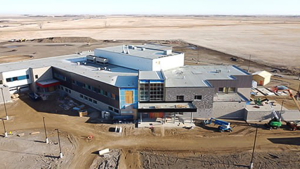More than two dozen women from Barren Lands First Nation, a community of 1,200 on the shore of Reindeer Lake in northern Manitoba, are participating in a 19-week construction job-readiness program.
The Cree community close to the Saskatchewan border is home to the latest initiative of the Manitoba Construction Sector Council (MCSC) aimed at getting more Indigenous women into the construction workforce.
The first intake or recruits from the surrounding area are receiving instruction that will prepare them for careers in the construction industry. The program started in February and is funded in partnership with the Northern Manitoba Sector Council and several provincial government agencies.
The women are being tutored on job-readiness and safety training, water and waste infrastructure installation, and framing. The training will run until late June and, upon completion of the course, the participants will be prepared to work on homebuilding projects in the community.
“It’s going extremely well,” says MCSC executive director Carol Paul. “We always do job-readiness training first and that teaches them all the stuff like stress management, budgeting, all the things that get in the way of work. You’ve gone from not working to suddenly working full-time so it’s quite a change.”
The program is part of an initiative that was established by the MCSC and the Manitoba Status of Women Secretariat. A year ago, Paul was brainstorming with Jamie Carnegie, executive director of the secretariat, about the training needs of communities in Manitoba and the work that was underway.
“We started saying, ‘Why don’t we offer training for women in remote communities?’” Paul recalls.
Instead of looking for funding and then setting up a training program, they chose a different approach. They went to the communities first to find out what they needed, then searched for the funding.
Cross Lake was the first community selected, and 16 women were trained on blast hole drilling. Safety consultants provided instruction on how to avoid danger, followed by classroom and simulator training. Later, courses were offered in the communities of York Landing, Berens River, and Pinaymootang.
The MCSC decided to offer a water and waste infrastructure and framing training course at Barren Lands because many of the communities have water treatment plants and houses were being built.
William Kirkness, Indigenous liaison at the MCSC, says training opportunities in remote northern communities are limited but there is a need for people with skills to assist in homebuilding projects.
“There is an upcoming new site development that involves water and wastewater line installation as well as new house builds. There are seven houses proposed to be built this year as well as seven more the following year.”
Upon completion of the course, the women will be able to help with the water and wastewater line installations as well as work on homebuilding projects, and complete renovation projects on their own. The leadership of the First Nations community signed off on a resolution supporting the training and a commitment to hiring the female graduates to work on local house build projects.
Kirkness says as part of the training, women in the program will learn about the importance of time management, a good work ethic and professionalism in the workplace. They will also be taught about the construction industry and provided with information on mental health management.
He says the initiative is important because construction companies working in the north have been actively recruiting trained Indigenous community members for local renovation projects and it negates having to bring in skilled labour from the south, reducing travel and accommodation costs.
He says Manitoba construction companies are facing skill shortages as a result of the aging workforce.
“The women are eager to learn and get into the construction industry.”
According to Paul, it is critical construction companies get more women into the workforce quickly.
“We have nobody to fill these positions. It’s at a crisis point right now. We’re coming into a construction season, and we’re saying, ‘Where are we going to get the people?’ They can’t accept jobs if they don’t have the labour to complete these tasks.”
Presently, women make up only four per cent of the construction workforce, so there are plenty of opportunities, notes Paul.
“Overall, what’s happening in construction companies is that they’re recognizing that women are easier on equipment, and they have that attention to detail,” she says. “Employers are recognizing the need.”
The MCSC is presently working with the City of Winnipeg and is looking to work with the province and heavy construction associations on a social procurement policy that will lead to more diversity in the workplace.
Employers are getting it, she adds, and are increasingly looking at ways to better accommodate workers.
“In the past, there were the 12-hour days, and it was just not working so we have to start looking at how can we accommodate so that we can get quality people who want to grow with the company.”











Recent Comments
comments for this post are closed